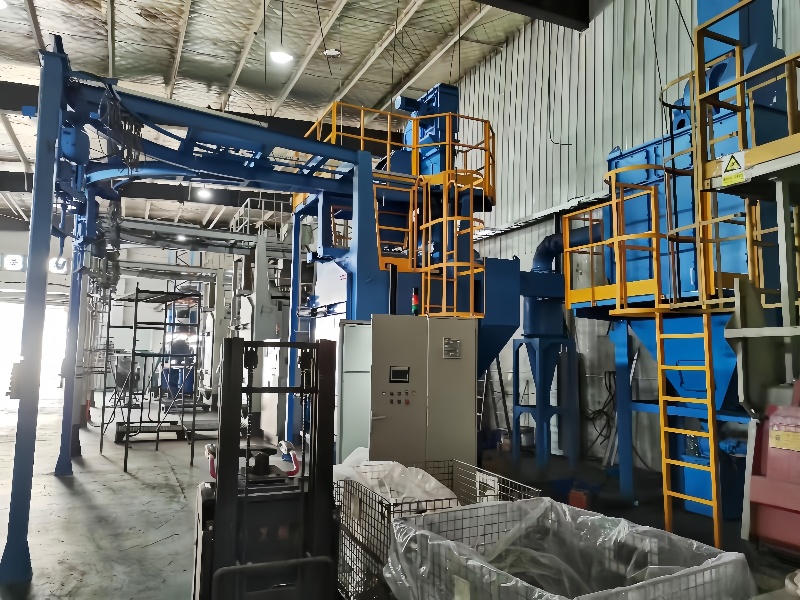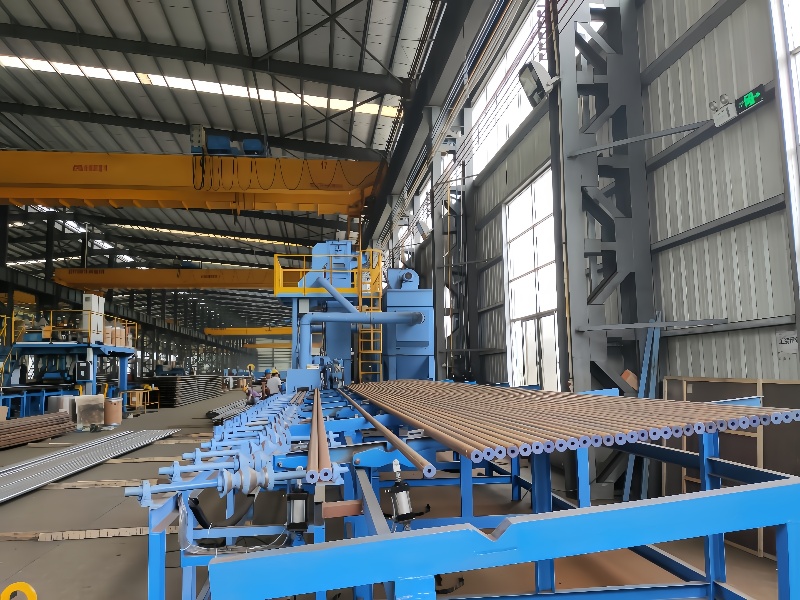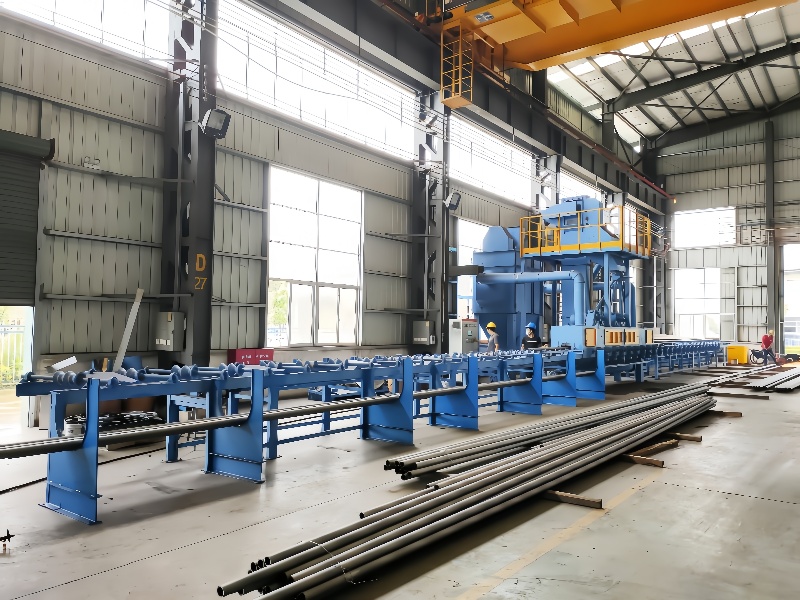Hotline
+86-136 8495 9862
Email:cennia@szmizhi.com
Add::104,Building 27,Third Industrial Zone, Longxi Community,Longgang District,Shenzhen,China.
Coil Forming & Handling Equipment
Surface Treatment Equipment
Solutions
Application
About Us

Welcome to MIZHI
For consultation/feedback, please call the service hotline: +86-136 8495 9862 Email:cennia@szmizhi.com
Our company is well received by customers with perfect solutions, good product quality, performance, and after-sales

In the realm of modern manufacturing and engineering, the demand for components with exceptional fatigue resistance has become increasingly crucial. High stress environments, cyclic loading, and extended service life requirements pose significant challenges to the integrity of mechanical parts. High intensity shot peening machines have emerged as a game changing solution, offering a highly effective method to enhance the fatigue resistance of various components.
Shot peening, a surface treatment process, involves propelling small spherical particles, known as shot, at high velocities onto the surface of a workpiece. High intensity shot peening machines take this process to the next level, delivering a more intense and precisely controlled shot impact. By inducing compressive residual stresses on the surface of components, these machines can significantly improve their fatigue life, reduce the likelihood of crack initiation and propagation, and enhance overall mechanical performance. This article will provide an in depth exploration of high intensity shot peening machines for fatigue resistance, covering their working principles, key components, applications, advantages, and future trends.

Shot peening has emerged as a critical surface treatment technology in aerospace manufacturing, enabling the enhancement of fatigue life and stress resistance in high-value components. Unlike conventional shot blasting, which focuses on cleaning or finishing, shot peening for aerospace applications involves the precise acceleration of metallic or ceramic shot to induce compressive residual stresses in component surfaces. This process is indispensable for parts subjected to cyclic loading, such as turbine blades, landing gear components, and engine shafts, where even minor surface defects can lead to catastrophic failures.
Aerospace-grade shot peening machines are designed with:
Ultra-precise shot velocity control (±2% tolerance)
Advanced media classification to micron-level accuracy
Multi-axis component manipulation for complex geometries
Stringent process monitoring to meet NADCAP and OEM standards
The technology has evolved significantly to address the unique challenges of aerospace materials, including titanium alloys, nickel-based superalloys, and composite structures, where process consistency and traceability are non-negotiable.

In the dynamic landscape of industrial pipeline manufacturing and maintenance, the need to treat pipes of varying diameters has driven the development of specialized pipe shot blasting machines. These machines are engineered to accommodate a wide range of pipe sizes, from small-bore tubing to large-diameter industrial pipelines, ensuring consistent surface treatment regardless of dimensions. The ability to handle different pipe diameters efficiently is critical for industries such as oil and gas, water treatment, construction, and chemical processing, where pipelines of diverse specifications are ubiquitous.
This article delves into the design principles, operational mechanisms, and application scenarios of pipe shot blasting machines tailored for different pipe diameters. It explores how these machines balance versatility with precision, addressing the unique challenges posed by varying pipe sizes while maintaining high standards of surface cleanliness and preparation.

Pipe shot blasting machines have evolved significantly to meet the diverse surface treatment needs of the pipeline industry, with adjustable nozzle angle technology emerging as a game-changer for precision and versatility. Unlike fixed-nozzle systems, which struggle to adapt to varying pipe geometries and surface requirements, these machines enable real-time adjustment of blasting nozzles to optimize coverage, intensity, and efficiency. This innovation is particularly critical for processing pipes with complex features such as bends, weld seams, and threaded ends, where uniform surface treatment is essential for coating adhesion, corrosion resistance, and structural integrity.
Adjustable nozzle angle systems are designed to:
Adapt to Diverse Pipe Configurations: Handle straight pipes, elbows, tees, and other fittings with equal effectiveness.
Optimize Blasting Intensity: Tailor nozzle angles to deliver varying degrees of abrasion based on surface conditions.
Enhance Operational Efficiency: Reduce setup times and minimize rework by eliminating the need for multiple machine setups.
Improve Surface Consistency: Ensure uniform roughness and cleanliness across complex geometries.
This technology has revolutionized pipe surface preparation in industries ranging from oil & gas to construction, enabling higher quality finishes and greater process flexibility.

In the realm of industrial maintenance, construction, and pipeline operations, the need for efficient on site surface treatment of pipes has given rise to the development of portable pipe shot blasting machines. These machines are specifically engineered to address the challenges associated with treating pipes in various field environments, where traditional, stationary shot blasting equipment may be impractical or inaccessible.
Portable pipe shot blasting machines combine the power and effectiveness of conventional shot blasting technology with enhanced mobility and flexibility. They offer a convenient and efficient way to clean, descale, and prepare pipe surfaces directly at the job site, eliminating the need to transport pipes to a centralized facility for treatment. This not only saves time and costs but also allows for immediate surface treatment, ensuring that projects can progress smoothly without unnecessary delays. As industries increasingly prioritize on site efficiency and cost effectiveness, the importance of portable pipe shot blasting machines continues to grow. This article will provide an in depth exploration of these machines, covering their design features, working principles, applications, advantages, and future trends.

High pressure pipe shot blasting machines represent a specialized category of surface treatment equipment designed to clean, descale, and profile the internal and external surfaces of pipes, tubes, and cylindrical components. Engineered to withstand and utilize high-pressure dynamics, these systems are critical for preparing pipes for coating, welding, or structural applications in industries such as oil & gas, construction, and infrastructure. Unlike general-purpose blasting machines, high pressure systems generate intense abrasive streams to tackle heavy-duty rust, mill scale, and concrete deposits on pipes ranging from 25 mm to 2,000 mm in diameter.
The defining features of high pressure pipe blasting machines include:
High-Velocity Abrasive Propulsion: Achieving particle speeds of 80-120 m/s (vs. 50-80 m/s in standard systems) for aggressive material removal.
Specialized Nozzle and Delivery Systems: Designed to focus abrasive streams on cylindrical surfaces with precision.
Robust Construction: Capable of withstanding the forces generated by high-pressure operation and prolonged exposure to abrasive media.
Automated Pipe Handling: To ensure uniform treatment around the pipe circumference and along its length.
This technology has revolutionized pipe surface preparation, enabling faster processing, higher quality finishes, and compliance with strict industry standards like SSPC-SP 10 (Near-White Metal Blast Cleaning).

In the industrial domain, pipelines play a crucial role in transporting various substances, including oil, gas, water, and industrial fluids. The integrity and durability of these pipelines heavily rely on proper surface treatment, especially for long pipes that are exposed to diverse environmental conditions and internal pressures over extended periods. The pipe shot blasting machine for long pipes has emerged as a specialized and indispensable tool in the pipeline manufacturing, maintenance, and construction industries.
This type of shot blasting machine is designed with unique features and capabilities to address the specific challenges associated with treating long pipes. It offers an efficient and effective way to clean, descale, and prepare the surfaces of long pipes, ensuring the subsequent coating or lining adheres properly and enhancing the overall lifespan of the pipelines. As industries strive for higher quality, increased productivity, and cost effectiveness in pipeline operations, a comprehensive understanding of pipe shot blasting machines for long pipes becomes essential. This article will delve into the working principles, key components, applications, advantages, and future trends of these specialized machines.

In the dynamic landscape of industrial surface treatment, the compact tumble belt shot blasting machine has emerged as a revolutionary solution, bridging the gap between efficiency and space constraints. As industries increasingly seek to optimize their production floors while maintaining high quality surface treatment standards, these machines have become a preferred choice for manufacturers dealing with a diverse range of workpieces. Unlike their heavy duty counterparts, compact tumble belt shot blasting machines are designed with a focus on agility, adaptability, and minimal footprint, making them ideal for small to medium scale production facilities, research and development centers, and workshops where space is at a premium. This article will embark on an in depth exploration of compact tumble belt shot blasting machines, covering their unique design features, operational principles, applications, advantages, and the future trends shaping their evolution.